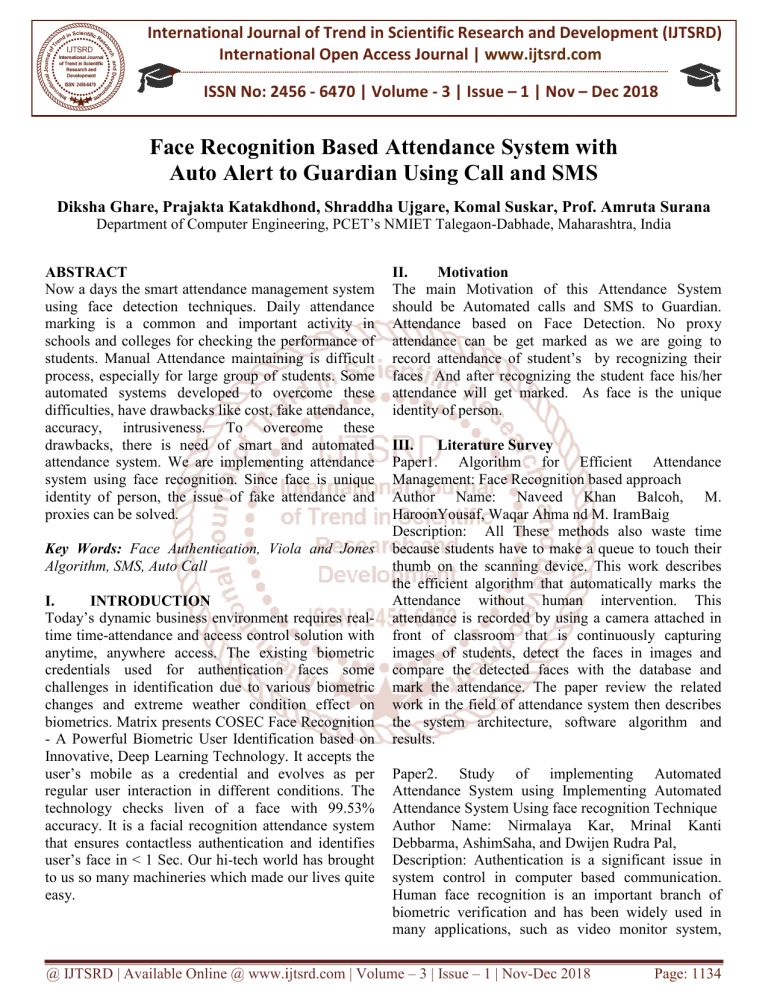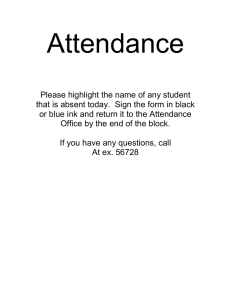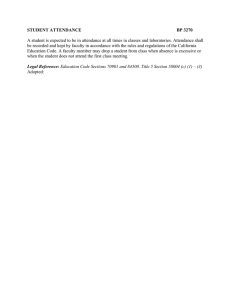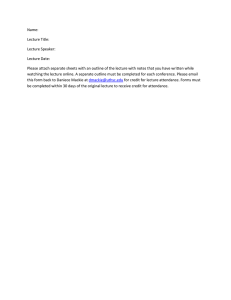
International Journal of Trend in Scientific Research and Development (IJTSRD)
International Open Access Journal | www.ijtsrd.com
ISSN No: 2456 - 6470 | Volume - 3 | Issue – 1 | Nov – Dec 2018
Face Recognition Based Attendance System with
Auto Alert too Guardian Using Call and
nd SMS
Diksha Ghare, Prajakta Katakdhond
Katakdhond, Shraddha Ujgare, Komal Suskar, Prof. Amruta Surana
Department off Computer Engineering, PCET’s NMIET Talegaon-Dabhade, Maharashtra,
Maharashtra India
ABSTRACT
Now a days the smart attendance management system
using face detection techniques. Daily attendance
marking is a common and important activity in
schools and colleges for checking the performance of
students. Manual Attendance maintainin
maintaining is difficult
process, especially for large group of students. Some
automated systems developed to overcome these
difficulties, have drawbacks like cost, fake attendance,
accuracy, intrusiveness. To overcome these
drawbacks, there is need of smart and aut
automated
attendance system. We are implementing attendance
system using face recognition. Since face is unique
identity of person, the issue of fake attendance and
proxies can be solved.
Key Words: Face Authentication, Viola and Jones
Algorithm, SMS, Auto Call
I.
INTRODUCTION
Today’s dynamic business environment requires real
realtime time-attendance
attendance and access control solution with
anytime, anywhere access. The existing biometric
credentials used for authentication faces some
challenges in identification due to various biometric
changes and extreme weather condition effect on
biometrics. Matrix presents COSEC Face Recognition
- A Powerful Biometric User Identification based on
Innovative, Deep Learning Technology. It accepts the
user’s mobile as a credential and evolves as per
regular user interaction in different conditions. The
technology checks liven of a face with 99.53%
accuracy. It is a facial recognition attendance system
that ensures contactless authentication and identifies
user’s face in < 1 Sec. Our hi-tech world
ld has brought
to us so many machineries which made our lives quite
easy.
II.
Motivation
The main Motivation of this Attendance System
should be Automated calls and SMS to Guardian.
Attendance based on Face Detection. No proxy
attendance can be get marked as we
w are going to
record attendance of student’s by recognizing their
faces And after recognizing the student face his/her
attendance will get marked. As face is the unique
identity of person.
III.
Literature Survey
Paper1. Algorithm for Efficient Attendance
Management: Face Recognition based approach
Author Name: Naveed Khan Balcoh, M.
HaroonYousaf, Waqar Ahma nd M. IramBaig
Description: All These methods also waste time
because students have to make a queue to touch their
thumb on the scanning device. This work
wo describes
the efficient algorithm that automatically marks the
Attendance without human intervention. This
attendance is recorded by using a camera attached in
front of classroom that is continuously capturing
images of students, detect the faces in images and
compare the detected faces with the database and
mark the attendance. The paper review the related
work in the field of attendance system then describes
the system architecture, software algorithm and
results.
Paper2.
2. Study of implementing Automated
Attendance System using Implementing Automated
Attendance System Using face recognition Technique
Author Name: Nirmalaya Kar, Mrinal Kanti
Debbarma, AshimSaha, and Dwijen Rudra Pal,
Description: Authentication is a significant issue in
system control
trol in computer based communication.
Human face recognition is an important branch of
biometric verification and has been widely used in
many applications, such as video monitor system,
@ IJTSRD | Available Online @ www.ijtsrd.com | Volume – 3 | Issue – 1 | Nov-Dec
Dec 2018
Page: 1134
International Journal of Trend in Scientific Research and Development (IJTSRD) ISSN: 2456-6470
2456
human-computer
computer interaction, and door control system
and network security.
ity. This paper describes a method
for Student’s Attendance System which will integrate
with the face recognition technology using Personal
Component Analysis (PCA) algorithm. The system
will record the attendance of the students in class
room environment automatically and it will provide
the facilities to the faculty to access the information of
the students easily by maintaining a log for clock
clock-in
and clock-out time.
Paper3.
3. Face Recognition using Principal Component
Analysis in MATLAB
Author Name: P Singh, A Sharma
semi-automated
Description: The papers present an semi
program for human face recognition. A self prepared
database of different faces is used. Task of removing
background from the image is a challenge but on the
other hand by implementing Viola
Viola-Jones face
detection algorithm and by Principal Component
analysis it is possible. An application of system can be
real time implementation of face recognition system.
A robust and reliable form of recognition can be done
by using Principal Component analysis.
Paper4.
4. Face recognition using eigen faces
Author Name: M. Turk and A. Pentland
Description: We present an approach to the detection
and identification of human faces and describe a
working, near-real-time
time face recognition system
which tracks a subject’s
ect’s head and then recognizes the
person by comparing characteristics of the face to
those of known individuals. Our approach treats face
recognition as a two-dimensional
dimensional recognition
problem, taking advantage of the fact that faces are
are normally uprightt and thus may be described by a
small set of 2-D
D characteristic views. Face images are
projected onto a feature space (“face space”) that best
encodes the variation among known face images. The
face space is defined by the “eigenfaces”, which are
the eigenvectors
nvectors of the set of faces; they do not
necessarily correspond to isolated features such as
eyes, ears, and noses. The framework provides the
ability to learn to recognize new faces in an
unsupervised manner.
Attendance management is important to every single
organization; it can decide whether or not an
organization such as educational institutions, public or
private sectors will be successful in the future.
Organizations will have to keep a track of people
within the organization such as employees and
students to maximize their performance. Managing
student attendance during lecture periods has become
a difficult challenge. The ability to compute the
attendance percentage becomes a major task as
manual computation
tion produces errors, and wastes a lot
of time. Authentication is a significant issue in
system control in computer based communication.
Human face recognition is an important branch of
biometric verification and has been widely used in
many applications, such as video monitor system,
human-computer
computer interaction, and door control system
and network security. This paper describes a method
for Students Attendance System which will integrate
with the face recognition technology using Personal
Component Analysis algorithm. The system will
record the attendance of the students in class room
environment automatically and it will provide the
facilities to the faculty to access the information of the
students easily by maintaining a log for clock-in
clock and
clock-out time.
V.
Architecture of proposed system
IV.
Existing System
In the existing system the system only detect Images
and save in the database for attendance system. In the
existing system face recognition the recognition of the
face is direct without removing any noise and absent
record were not send to guardian.
@ IJTSRD | Available Online @ www.ijtsrd.com | Volume – 3 | Issue – 1 | Nov-Dec
Dec 2018
Page: 1135
International Journal of Trend in Scientific Research and Development (IJTSRD) ISSN: 2456-6470
2456
VI.
Propose System
The experimental setup Patterns of face pictures of an
single student is stored in the databank at time of
registration. so the faces are then recognised from that
of the image then the procedure matches with the
database. The attendance marked on server if any of
the face identified from the database and it can be
accessed by everyone for numerous reasons. This also
habits the procedure that can be used for attendance.
The system is also attached with the time table unit
that robotically gets class at whatt time and what
subject. The system robotically becomes presence
deprived of opinions the learners and the teachers. So
teachers after coming to the class when taking
attendance they just press the attendance button to
start the attendance procedure. This method is highly
protected method here no one can give the attendance
of the other and also saves a lot of time.
VII. Algorithm:
Viola-Jones Algorithm
The Viola-Jones
Jones algorithm is a widely used
mechanism for object detection. The main property of
this algorithm is that training is slow, but detection is
fast. This algorithm uses Haar basis feature filters, so
it does not use multiplications.
Jones algorithm can be
The efficiency of the Viola-Jones
significantly increased by first generating the integral
image.
The integral image allows integrals for the Haar
extractors to be calculated by adding only four
numbers. For example, the image integral of area
ABCD is calculated as II(yA,xA) – II(yB,xB) –
II(yC,xC) + II(yD,xD).
VIII. Conclusion
Capturing the images from camera or cc camera and
applying techniques face detection and recognition
can decrease the manual work from human and
increase the security safety, taking the decision from
this recognition result. Based on this face detection
and recognition can used in implement so many
application like automatic attendances system based
on face recognition, worker attendances, security,
safety like finding thief in image that help to catching
thief. In this system we have implemented an
attendance system for a lecture, section or laboratory
by which lecturer or teaching assistant an record
students attendance. It saves time and effort,
especially if it is a lecture with huge number of
students. The complete system is implemented in
JAVA. This attendance system
m shows the use of facial
recognition techniques for the purpose of student
attendance and for the further process this record of
student can be used
ed in Attendance related issues.
IX.
Reference
1. Naveed Khan Balcoh, M. HaroonYousaf, Waqar
Ahma nd M. IramBaig, Algorithm for efficient
Attendance Management: Face Recognition Based
approach, International Journal of Computer
Science Issue, Vol.9, Issue 4, No 1, July 2012.
2. NirmalayaKar,
MrinalKantiDebbarma,
AshimSaha, and DwijenRudraPal, Study of
implementing Automated
tomated Attendance System
using Implementing Automated Attendance
System Using face recognition Technique,
International
Journal
of
Computer
and
Communication Engineering, Vol1,
Vol No 2,July
2012
3. O. Shoewn Development of Attendance
Management System using
usin Biometrics. The
Pacific Journal of Science and Technology
Volume 13, No 1, May 2012
4. M. Turk and A. Pentland (1991) “Face recognition
using eigen faces”. Proc. IEEE conference on
computer vision and Pattern Recognition
5. W. Zhao, R. Chellapa, P. J. Phillips and A.
Rosenfld, ”Face Recognition: A Literature Survey,
vol. 35, No 4, Dec 2003, pp.399-458
pp.399
6. R. L. Hsu, Mottalec M.A and A. K. Jain, ”Face
Detection in colour images”, Proceedings
International Conference on Image Processing,
Oct 2001,pp. 1046-1049
7. ToufiqP. Ahmed Egammal and Anurag mittal
(2006),”A Framework for feature selection for
Background Subtraction”, in Proceedings of IEEE
computer Society Conference on Computer Vision
and Pattern Recognition..
8. M. H. Yang, N. Ahuja and D. Kriegmao, “Face
recognition
cognition using kernel eigenfaces”, IEEE
International Conference on Image Processing,
vol.1, pp. 10-13,
13, Sept. 2000
@ IJTSRD | Available Online @ www.ijtsrd.com | Volume – 3 | Issue – 1 | Nov-Dec
Dec 2018
Page: 1136




